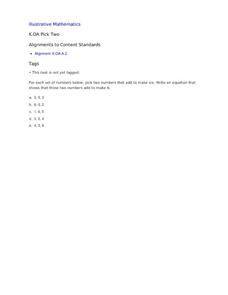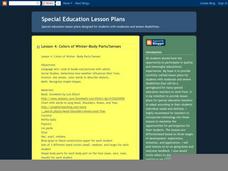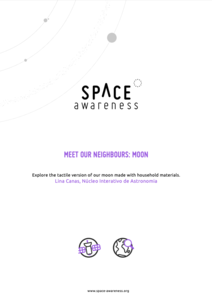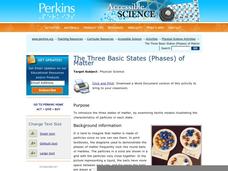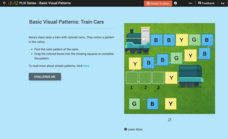Perkins School for the Blind
Tactile quilts that tell a story
Learners with multiple disabilities need to engage in projects that push them to know their full potential. They need to be able to express themselves in a variety of ways, and this very thoughtful lesson does just that. They make a...
NOAA
Build Your Own Ocean Ecosystem
Hold the sea in the palm of your hand! Amateur oceanographers work together to create models of an ocean ecosystem in the sixth and final installment in a series. Raise awareness of global ocean health issues through guided research,...
Perkins School for the Blind
The Function of Villi in the Small Intestine
Ever wonder what the villi in the small intestine do? I bet your class would love to find out. Mesh netting is used to represent small blood vessels on the outside of the intestine, and a chenille bath mat is used to represent the villi...
Illustrative Mathematics
Pick Two
Learning to break apart numbers into smaller pairs is a critical step young mathematicians take as they develop their number sense. To practice this skill, children are provided with sets of three numbers and are asked to pick the two...
Perkins School for the Blind
The Mystery Box - Making Observations and Collecting Data
Making observations and collecting qualitative and quantitative data is a vital skill all scientists need to practice. Help your scientists with partial and no sight learn how to use their other senses to make observations for...
Bright Hub Education
Math Lesson for Visually Impaired Early Learners: A 3 Way Counting Activity
A unique lesson that's designed for visually impaired early learners, but can be adapted for anyone, is here for you. Pupils use brightly colored foam letters, beads, checkers, and an abacus, in order to gain practice in identifying the...
Perkins School for the Blind
Conductors of Heat - Hot Spoons
Why is the end of a spoon hot when it's not all the way in the hot water? A great question deserves a great answer, and learners with visual impairments will use their auditory and tactile senses to get that answer. A talking...
Perkins School for the Blind
Building a Basic Series Circuit
Make science a fully accessible subject for your learners with visual impairments. They'll use tactile models to explore the nature of basic electrical circuits. Template board, wires, batteries, and Velcro are used to construct the...
Pyro Innovations
Beach Exploration
Little ones will absolutely love this lesson. It's all about the beach and what they can find while sifting through the sand. A large bucket of sand filled with hidden items is brought into the classroom. Learners will discuss what kinds...
National Gallery of Canada
Lumps, Bumps, Gritty, and Soft!
Texture can really add to a work of art. Explore texture through observation and practice. Learners view and discuss works of art by M.C. Escher. They then create their own texture samplers with six different materials.
Florida Center for Reading Research
Phonics: High Frequency Words, Sand Paper Words
Learners use a stack of words embellished with tactile elements, such as sandpaper, to practice high-frequency words. Pupils trace the tactile surface of each letter in the word, write it on their paper, then find and glue that word from...
Curated OER
Colors of Winter-Body Parts/Senses
Fun is in the air as learners with special needs engage in sensory-filled activities. They discuss color, snow, cold, winter, and body parts while touching and smelling various objects. They discuss the parts of the body with relation to...
Dick Blick Art Materials
No-Blender Pulp Painting
Like finger painting, this project is very tactile. Kids tear tissue paper into small pieces, add water, and mix up a pulp that can be pressed onto a canvas to create a colorful, textured painting.
Space Awareness
Meet Our Neighbors: Moon
Since a field trip to the moon isn't possible, bring the moon to young astronomers! Participants use everyday materials to create models of the moon and represent the features on its surface. The materials serve as a tactile as well as a...
Perkins School for the Blind
The Three Basic States (Phases) of Matter
There are three basic states of matter: Solid, liquid, and gas. Help your learners with visual impairments to understand the chemical nature of each state of matter with tactile elements. Marbles are used to model the particles in each...
Perkins School for the Blind
Conservation of Mass
How do you teach a student with visual impairments about the conservation of mass? You use tactile models that represent the theoretical concept. Baking soda and vinegar are used to add gas to a deflated balloon. Learners will feel the...
Perkins School for the Blind
Name That Frequency
How cool! This plan uses old cassette tapes to show frequency from traveling vibrations. To prepare for the lesson, tactile frequency diagrams are made and then placed near the video tapes or dominoes that are already set up. When they...
Perkins School for the Blind
Casting with Plaster
What a fun lesson! Your class can experience the design and construction process by creating a mold and a duplicate for an engraved image. The lesson is specifically written for learners with visual impairments and allows them to create...
Perkins School for the Blind
Student Store
Vocational training activities are extremely important for learners with intellectual or physical disabilities. Here is a great idea that will help your class become skilled at money handling, basic economic concepts, interpersonal...
Math Salamanders Ltd.
Missing Subtraction facts to 12 sheet 1
Pupils subtract numbers one through 12 and complete missing addend problems. This activity includes a helpful number line and 20 problems to complete. Tip: Hand out unifix cubes or chips to help tactile learners solve each problem.
Curated OER
Poetry in Triple Textures
Learners compare and contrast visual and tactile textures. They create a painting that highlights one or more textures. Students express these textures in a poem to accompany their art. They recognize that words can express the visual...
Perkins School for the Blind
The Printing Process
The printing process was a technological innovation that revolutionized the modern world. Your learners with visual impairments can experience this process by creating a print by using letterpress printing. They use cardboard, glue, and...
Perkins School for the Blind
Design and Problem Solving
What if you had a design problem you wanted to solve, but were unable to draw because you were unable to see? Teach your learners with visual impairments that they can use Wikki Stix®, a braille ruler, Legos®, and Constructo Straws to...
CK-12 Foundation
Basic Visual Patterns: Train Cars
An interactive comprised of five questions challenges young scholars to complete a simple pattern. After examining a train with colored carts, learners arrange a green, blue, and yellow block into their corresponding space. Questions are...





